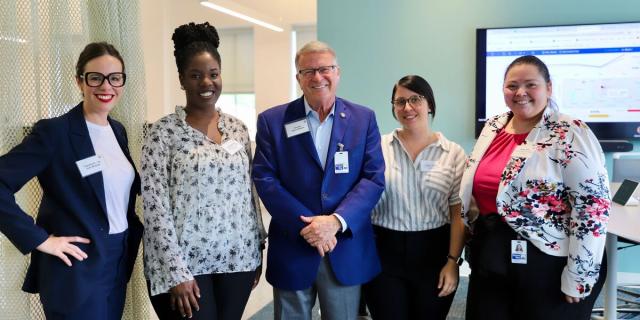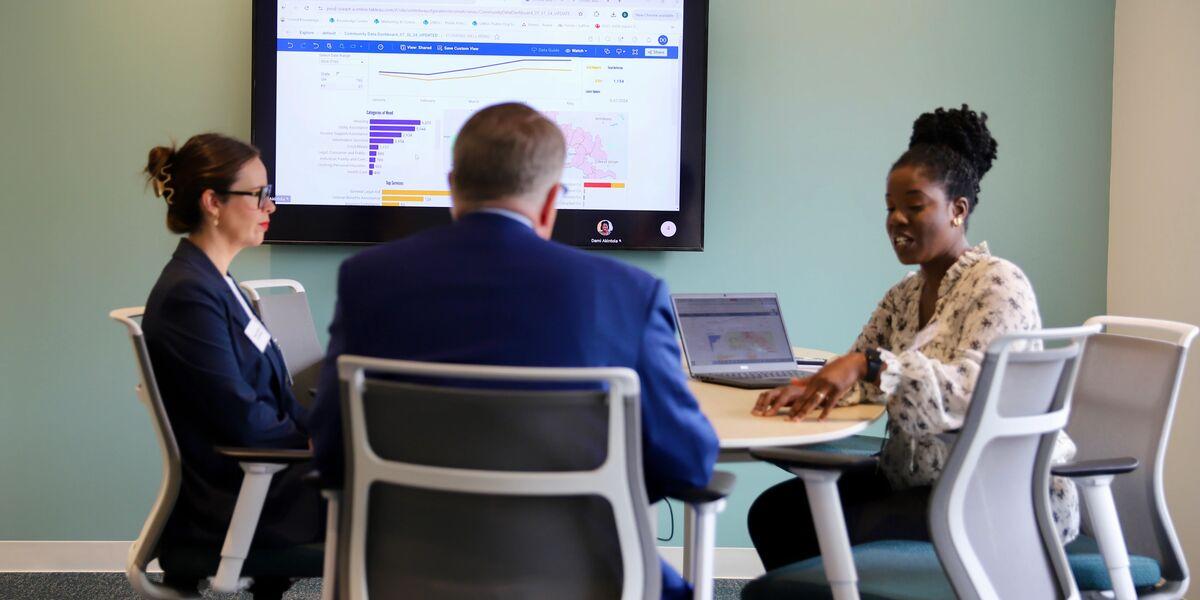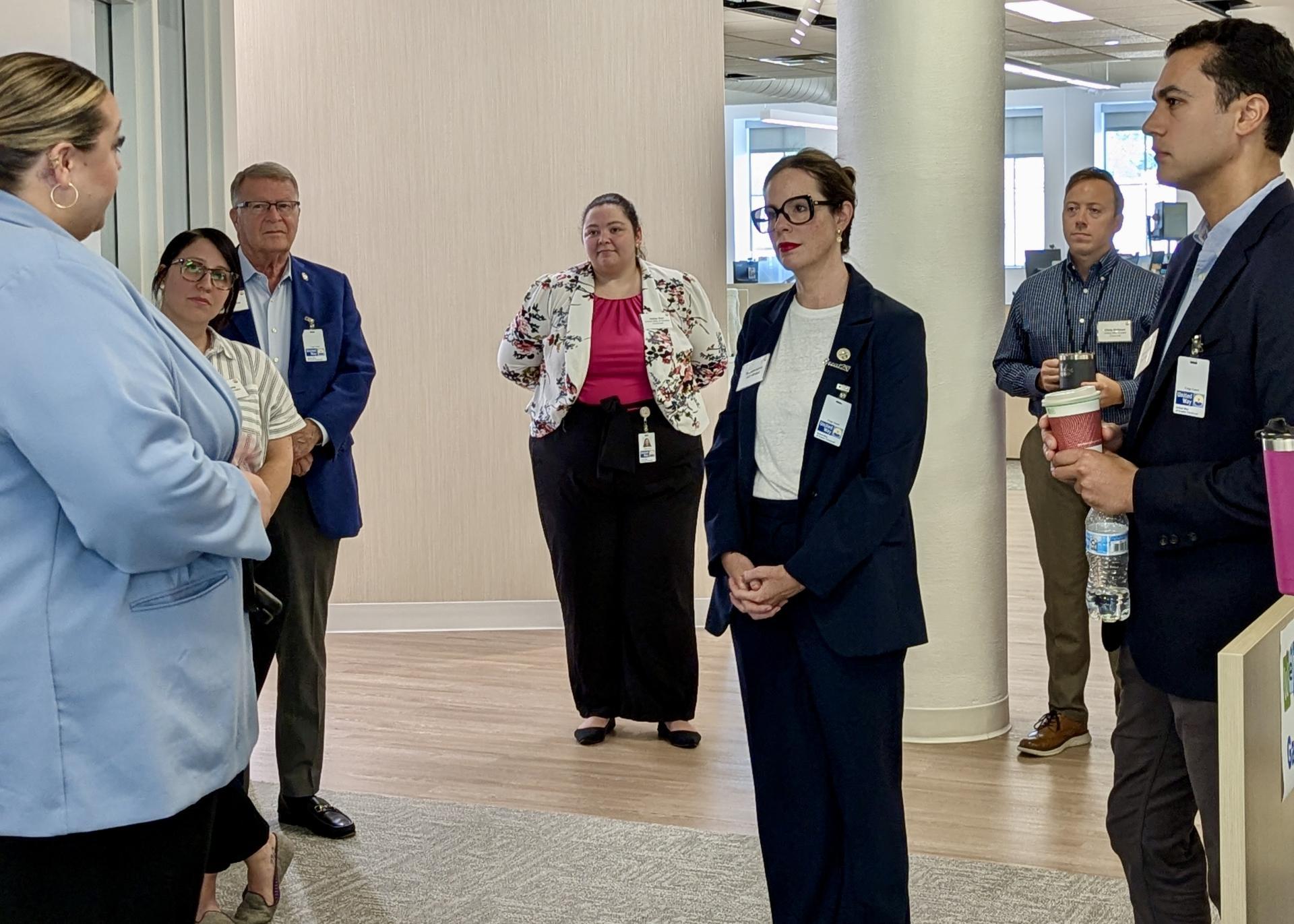Understanding 211 & unlocking its potential in underserved communities

(Photo: Katie Wallace / United Way of Greater Cincinnati)
By Hailey Barr, Public Policy & Advocacy Manager, United Way of Greater Cincinnati
CINCINNATI (August 2024) – Tens of thousands of requests for service come in to United Way of Greater Cincinnati’s 211 helpline each year. Ohio has more than a dozen 211 providers, but some areas still lack coverage. We recently met with a bipartisan group of policymakers to share 211 expansion efforts and growing pains experienced throughout the state.
Ohio State Sen. Steve Wilson (R-Maineville), Ohio State Rep. Dani Isaacsohn (D-Cincinnati), and Ohio State Rep. Jodi Whitted (D-Madeira) met United Way colleagues for a Legislative 211 Talk and Tour on Aug. 8. It was an opportunity for some of our state legislators to see for themselves what an important resource 211 is for our community.
United Way President and CEO Moira Weir spoke about the critical role 211 played during and after the COVID-19 pandemic. Over the past few years, our 211 has responded to a growing number of requests for service (40,000 in 2020 to 55,000 in 2023).
United Way Chief Impact Officer Amy Weber detailed the types of services included in our 211 database, explained what 211 coverage looks like across the state of Ohio, and discussed how 211 continues to expand. Policymakers also met with several United Way 211 staff members to learn what it takes to answer requests, maintain an updated resource database and track our 211 impact.
Rep. Whitted was surprised to learn that not all of Ohio’s 88 counties have 211 coverage, especially because she has called 211 many times to get assistance for families and individuals she worked with as a social worker and knows the value it provides communities firsthand. For several counties in northwest and southeast Ohio, access to 211 is a vital missing piece in ensuring all families can thrive, however, Ohio 211 providers are entirely privately funded and currently do not have the capacity to expand.
As the session started to wrap up, the legislative guests had one last question: “What would it take to get those vulnerable counties 211 coverage?”
One option is to expand the capacity of 211 providers to take on additional counties. The 14 providers across the state of Ohio would need significant funding to hire additional staff to help answer calls, respond to requests, update resource databases and provide training so all Ohioans receive the same level of care when they dial 211 for assistance.
As one of only a few states without any state funding, Ohio could help mitigate additional expansion costs by including Ohio 211 funding in the state budget. Ohio211 is the governing body that oversees the state’s 211 operations. It’s comprised of volunteer members from Ohio’s 14 providers. Their goal is to ensure 211 remains a consistent, trusted source of assistance for Ohio communities. This group would guarantee 211 providers receive the funding necessary to establish services in additional counties.
While state funding would benefit our 211 services, there’s federal legislation that would secure nationwide 211 funding. The Human-Services Emergency Logistic Program (HELP) Act of 2023 would strengthen existing 211 services and coordinate 211 and 988 services across the country.
Legislators from Ohio support the Help Act, including Sen. Sherrod Brown (D-OH), a cosponsor of the bipartisan bill in the U.S. Senate, and Ohio Rep. Emilia Strong Sykes (D-OH-13), a cosponsor of the bipartisan bill in the U.S. House of Representatives.
This work takes all of us, and we can become a stronger region because of it.
In all, 211 providers across Ohio responded to more than 870,000 requests last year. Imagine if 211 services were extended to families in the nearly 30 counties without it. How many more neighbors could we help find rent relief during a tough time? How many more families could we help find convenient access to healthy food? How many parents could we help locate a quality preschool for their children? The list goes on, and your voice matters.
If you have a moment to spare, please let your Congressional representatives know you support the HELP Act of 2023 by filling out your information here.
About United Way of Greater Cincinnati
United Way of Greater Cincinnati (UWGC) fights for the economic well-being of all people in Greater Cincinnati so our entire community can thrive – now and in the future. Founded in 1915, UWGC is one of the region’s largest nonprofit organizations. It is committed to working alongside policymakers, community partners and donors to promote educational success, financial empowerment and housing security. Learn more about UWGC’s work across nine counties in Ohio, Kentucky and Indiana at UWGC.org. #UnitedWeThrive

